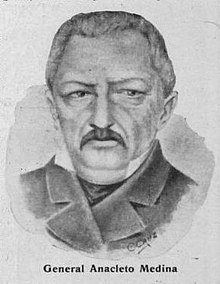This article has multiple issues. Please help
improve it or discuss these issues on the
talk page. (
Learn how and when to remove these template messages)
The topic of this article may not meet Wikipedia's
notability guideline for biographies. Please help to demonstrate the notability of the topic by citing
reliable secondary sources that are
independent of the topic and provide significant coverage of it beyond a mere trivial mention. If notability cannot be shown, the article is likely to be
merged,
redirected, or
deleted.Find sources:
"Anacleto Medina" –
news ·
newspapers ·
books ·
scholar ·
JSTOR (November 2021) (
Learn how and when to remove this message)
This article possibly contains
original research. Please
improve it by
verifying the claims made and adding
inline citations. Statements consisting only of original research should be removed. (November 2021) (
Learn how and when to remove this message)
.mw-parser-output .hidden-begin{box-sizing:border-box;width:100%;padding:5px;border:none;font-size:95%}.mw-parser-output .hidden-title{font-weight:bold;line-height:1.6;text-align:left}.mw-parser-output .hidden-content{text-align:left}@media all and (max-width:500px){.mw-parser-output .hidden-begin{width:auto!important;clear:none!important;float:none!important))You can help expand this article with text translated from
the corresponding article in Spanish. (April 2023) Click [show] for important translation instructions.
View a machine-translated version of the Spanish article.
Machine translation, like
DeepL or
Google Translate, is a useful starting point for translations, but translators must revise errors as necessary and confirm that the translation is accurate, rather than simply copy-pasting machine-translated text into the English Wikipedia.
Consider
adding a topic to this template: there are already 5,009 articles in the
main category, and specifying|topic= will aid in categorization.
Do not translate text that appears unreliable or low-quality. If possible, verify the text with references provided in the foreign-language article.
You must provide
copyright attribution in the
edit summary accompanying your translation by providing an
interlanguage link to the source of your translation. A model attribution edit summary is Content in this edit is translated from the existing Spanish Wikipedia article at [[:es:Anacleto Medina]]; see its history for attribution.
You may also add the template ((Translated|es|Anacleto Medina)) to the
talk page.
For more guidance, see
Wikipedia:Translation.
(
Learn how and when to remove this message)
Anacleto Medina (1788 – July 17, 1871) was a Uruguayan military, politician and caudillo who participated in the Brazilian War, the Argentine Civil War and the Guerra Grande in the Banda Oriental.[1][failed verification] He served in the Federal Army in the Unitary Army, and also in the Colorados and Blancos armies, during the Uruguayan Civil War.[2][irrelevant citation]
Born in Las Víboras, Colonia Department, Uruguay, he was the son of Luis Bernardo Medina, born in Santiago del Estero, Argentina, and Petrona Biera, belonging to a Creole family from the Banda Oriental.[3][failed verification]
During his military career he was under the command of the main military leaders, including Francisco Ramírez,[4][failed verification] Juan Lavalle, Fructuoso Rivera,[5] Justo José de Urquiza and Ricardo López Jordán. He died assassinated after the defeat of Manantiales, event occurred on July 17, 1871.[6][failed verification]
